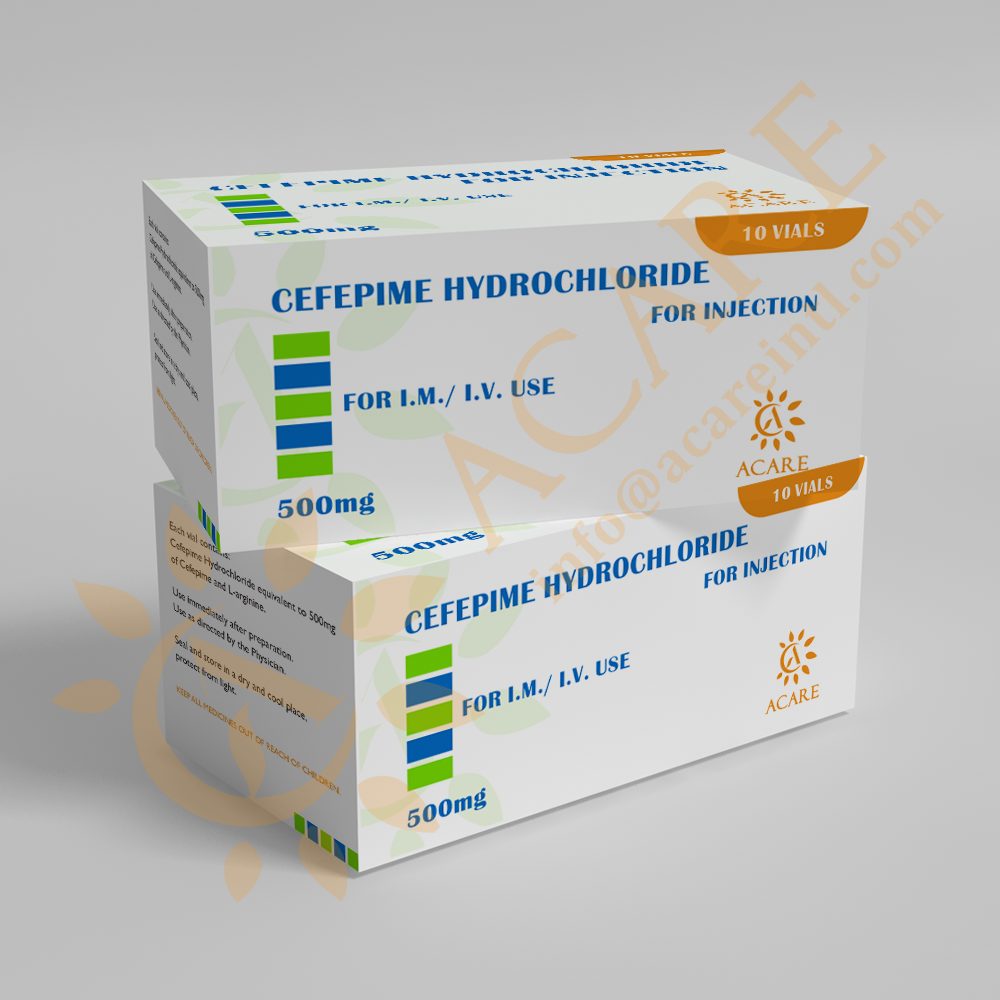Cefepime Hydrochloride for Injection
-
SpecificationCP;BP;USP;IP;Customized
-
dosage500mg;1g
-
Dosage FormsPowder for Injections
-
Packaging10;25;50;1
-
Active Ingredients:
Cefepime Hydrochloride
Indications:
---Adults
Cefepime is indicated in the treatment of the infections listed below when caused by susceptible bacteria. Culture and susceptibility studies should be performed to determine susceptibility of the causative organism(s) to cefepime.
• LOWER RESPIRATORY TRACT INFECTIONS:
Nosocomial and Community-Acquired Pneumonia caused by Staphylococcus aureus (methicillin-susceptible strains), Pseudomonas aeruginosa, Klebsiella species (including Klebsiella pneumoniae), Enterobacter species, Escherichia coli, Proteus mirabilis, Streptococcus pneumoniae (including intermediate penicillin resistant strains), Haemophilus influenzae (including beta-lactamase producing strains), Haemophilus parainfluenzae and Moraxella (Branhamella) catarrhalis (including beta-lactamase producing strains), including cases associated with Bacteremia. When P. aeruginosa is isolated or suspected, combination therapy with an aminoglycoside should be used.
Acute Bacterial Exacerbation of Chronic Bronchitis and Acute Bronchitis due to Streptococcus pneumoniae (including intermediate penicillin resistant strains), Haemophilus influenzae (including beta-lactamase producing strains), Moraxella (Branhamella) catarrhalis (including beta-lactamase producing strains).
• URINARY TRACT INFECTIONS:
Complicated Urinary Tract Infections caused by Escherichia coli, Pseudomonas aeruginosa, Klebsiella pneumoniae, Proteus mirabilis and Enterobacter species, including cases associated with Bacteremia. When P. aeruginosa is isolated or suspected, combination therapy with an aminoglycoside should be used.
Uncomplicated Urinary Tract Infections due to Escherichia coli, Proteus mirabilis, Klebsiella species and Enterobacter species.
• SKIN AND SKIN STRUCTURE INFECTIONS:
Skin and Skin Structure Infections caused by Staphylococcus aureus (methicillin-susceptible strains), Streptococcus pyogenes (Group A streptococci), Streptococcus agalactiae (Group B streptococci), other beta-haemolytic Streptococcus species, Enterobacter species, Klebsiella species, Proteus mirabilis, Morganella morganii, Escherichia coli, Serratia marcescens and Acinetobacter calcoaceticus.
• INTRA-ABDOMINAL INFECTIONS:
Complicated Intra-abdominal Infections Including Peritonitis and Biliary Tract Infections caused by Escherichia coli, sensitive Pseudomonas aeruginosa. Peritonitis is often polymicrobial and may include anaerobic micro-organisms such as Bacteroides species which are resistant to cefepime. When resistant anaerobes are suspected, cefepime should be combined with an antibiotic effective against these micro-organisms, including cases associated with Bacteremia.
In patients who are at risk of mixed aerobic-anaerobic infection, including infections in which Bacteroides fragilis may be present, concurrent therapy with an anti-anaerobic agent is recommended.
• EMPIRIC TREATMENT IN FEBRILE NEUTROPENIA:
Cefepime is indicated for empiric monotherapy of febrile neutropenia. Combination of cefepime with other appropriate antimicrobial agents should be considered in patients at high risk for severe infection (including patients with a history of recent bone marrow transplantation, hypotension at presentation, an underlying haematologic malignancy, or severe or prolonged neutropenia) or when called for by host or local epidemiological factors.
---Paediatrics
Cefepime is indicated in paediatric patients (2 months and older) for the treatment of the infections listed below when caused by susceptible bacteria, (when P. aeruginosa is isolated or suspected, combination therapy with an aminoglycoside should be used):
• LOWER RESPIRATORY TRACT INFECTION:
Pneumonia caused by S. aureus, S. pneumoniae, H. influenzae.
• URINARY TRACT INFECTIONS:
caused by E. coli.
• SKIN AND SKIN STRUCTURE:
Infections caused by Staphylococcus epidermidis, streptococcus, S. aureus, S. pyogenes.
• EMPIRIC TREATMENT IN FEBRILE NEUTROPENIA:
Cefepime is indicated for empiric monotherapy of febrile neutropenia. Combination of cefepime with other appropriate antimicrobial agents should be considered in patients at high risk for severe infection (including patients with a history of recent bone marrow transplantation, hypotension at presentation, an underlying haematologic malignancy, or severe or prolonged neutropenia) or when called for by host or local epidemiological factors.
Storage:
Seal and store in a dry and cool place, protect from light.


